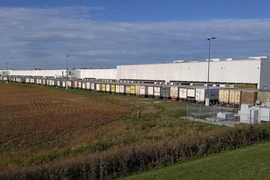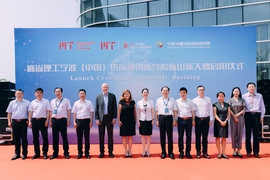In his new book “The New (Ab)Normal: Reshaping Business and Supply Chain Strategy Beyond Covid-19,” published today, MIT Professor Yossi Sheffi explains how companies grappled with the chaos of the Covid-19 pandemic and how they can survive and thrive as the crisis subsides. Sheffi pays particular attention to supply chains’ role in helping companies manage and recover from the pandemic.
“Much has been written about the pandemic, but the book takes a different perspective by showing how the virus emphasizes our interconnectedness and how supply chains are the connective tissue that is vital to the health of a vibrant society,” says Sheffi, the director of the MIT Center for Transportation and Logistics.
The book begins with an account of the struggle to mend the global economic fabric as the coronavirus ripped more holes in it. By viewing the crisis through a risk-management lens derived from Sheffi’s previous books, “The Resilient Enterprise” and “The Power of Resilience,” the author shows how companies create corporate immune systems to recognize and manage large-scale disruptions quickly.
Having set the scene, Sheffi describes the emergence of a “new normal” where phenomena such as business safe zones that protect customers and workers from the contagion and the rise of telecommuting redefine daily life. The new normal reshapes supply chains as well. For example, the acceleration of technology trends during the crisis could profoundly influence the future performance of supply chains, argues Sheffi.
He also explores broader changes wrought by Covid-19. An example is how the pandemic affirms supply chains’ critically important societal role. Civilization depends on supply chains to convert the planet’s bounty into needed products and deliver those products to 7.8 billion human beings at an affordable price. Sheffi shows that contrary to many media headlines, supply chains performed heroically during the pandemic and maintained supplies of critical products such as food. Yet, he acknowledges that there were failures and offers prescriptions for avoiding future breakdowns in health-care supplies.
The book ends with a look at the post-pandemic future — and the outlook is not necessarily gloomy. For instance, technological advances inspired by the crisis could level the playing field between small and large companies. Nimble small businesses can use a growing array of off-the-shelf cloud computing and mobile apps to narrow the competitive gap between themselves and larger rivals.
An essential lesson from the crisis is that flexibility and agility are critical to managing the pandemic’s disruptions and the pivot towards a changed future.
Supply chains will be at the core of the recovery. As “The New (Ab)Normal” highlights, supply chains served humanity during this global crisis and will continue to do so when the pandemic subsides, and beyond.
“One of my key objectives in writing the book is to help executives adapt their business models and supply chains to a world transformed by Covid-19,” says Sheffi.









